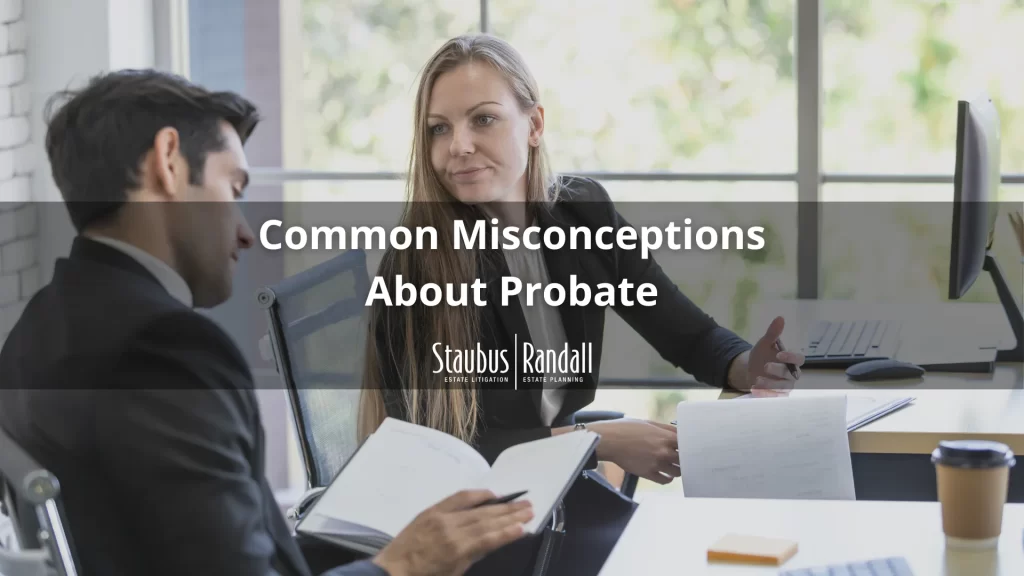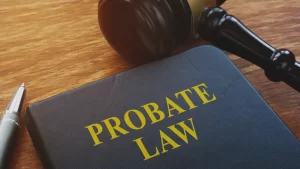
When someone dies, their last will and testament must enter probate. A probate judge reviews the will to confirm its validity and authorizes the executor to administer the estate.
The thought of putting your family through probate can be upsetting and stressful. You want your loved ones to receive the assets they deserve without enduring a complicated legal process. However, probate isn’t as scary as it might seem.
Below are the most common misconceptions about probate in Texas.
1. The State Takes Every Possession if There Isn’t a Will
One of the most common misconceptions about probate is where a person’s belongings end up if they die without a valid will. Many think the state will assume ownership of everything, and surviving family will never receive any assets.
However, that’s not true. According to Chapter 201 Subchapter A of the Texas Estates Code, an estate passes to surviving heirs by intestate succession if there isn’t a will. That means your assets will be distributed to your spouse, children, parent, and other individuals in your line of succession.
Intestate succession isn’t a problem for some people. However, if you’re not close to your family or want specific assets to pass to one heir over another, creating a will and naming beneficiaries is crucial.
2. Probate Takes Years to Complete
The probate process can take some time. However, it doesn’t necessarily take years. It might take a while if someone contests the will or files a lawsuit against the executor for misconduct.
The length of probate also depends on the size of the estate. Typically, probate can take about six months or up to a year for the judge to approve the administration of the estate.
3. The Oldest Child Must Be the Executor
Choosing your oldest child as the executor of your estate might make sense. However, it isn’t a law. You can appoint anyone as the executor of your estate if they meet the requirements.
Your executor can be a sibling, parent, friend, or coworker. They must be at least 18 years old and of sound mind. They must also not have a conflict of interest or have been convicted of a state or federal felony.
4. Estate Taxes Will Drain the Estate
Estate taxes are a real thing. Administering an estate requires paying taxes, debts, and other obligations. However, Texas does not impose an estate tax.
The federal estate tax only applies to estates worth over $12,060,000 as of 2022. Starting in 2023, an estate is subject to federal estate taxes if the value is over $12,920,000. Unless your estate exceeds those tax exemptions, you don’t have to worry about your family using most or all of your assets to pay taxes.
5. Avoiding or Minimizing Probate Isn’t Possible
Your entire estate can’t avoid probate. Probate is necessary to validate your will. However, you can set up parts of your estate to avoid probate, so some of your assets transfer automatically upon your death.
How to Avoid Probate in Texas
 Multiple options are available for minimizing probate assets so beneficiaries can receive property without waiting for the court to authorize the distribution. You should consider these options while creating your estate plan to prevent your family from encountering complications:
Multiple options are available for minimizing probate assets so beneficiaries can receive property without waiting for the court to authorize the distribution. You should consider these options while creating your estate plan to prevent your family from encountering complications:
- Revocable living trust – A revocable living trust is a type of trust you can control while you’re alive. You can transfer and remove assets, change beneficiaries, and revoke the trust at any point during your lifetime. When you die, the assets held in the trust will pass directly to your named beneficiaries according to the instructions in your trust agreement.
- Joint ownership with a right of survivorship – Two or more people can own property and establish joint ownership with a right of survivorship. It gives the surviving owner control of the asset upon the other owner’s death.
- Transfer-on-death (TOD) deed – You can use a TOD deed for real estate, brokerage accounts, motor vehicles, and qualified securities—ownership transfers to your named beneficiary or beneficiaries when you die.
- Beneficiary designations – You should complete a beneficiary designation form on your financial accounts. Your beneficiary can access the funds after you pass away without going through probate. You can include a beneficiary designation for savings bonds, life insurance policies, securities accounts, retirement plans, and bank accounts.
Get Help with Your Estate Plan
Estate planning is time-consuming. You must complete all necessary documents according to the requirements of state law. Errors can cause significant problems for your family, leading to will contests, creditor claims, and other legal disputes. You can make the process easier for your loved ones by establishing a well-prepared estate plan with an experienced probate lawyer in Dallas, Tx.
The Dallas estate planning attorneys of Staubus, Blankenship, Legere and Walker PLLC have over 100 years of combined experience in estate planning. We can help protect your assets and your family’s future. Call us at (214) 833-0100 to schedule a consultation today.
Related Post
How Long Do You Have to Contest a Will in Texas?

Your will contains your last instructions to family and friends about how you want your estate distributed. Although every will is different, there are essential items you should address and components you must include to ensure the document is legal.
Texas has requirements a will must meet to be considered valid. One of these is that there must be a physical document. In other words, it cannot only exist as a digital document. You must be at least 18 years old to create a valid will, and the will must be made voluntarily of your own free will by a person who is of sound mind.
Additionally, the document must include verbiage that makes it a will and be signed in the presence of two credible witnesses who must also sign it. Making the document legal is a vital part of creating a will, so you will likely want to work with a Dallas estate planning attorney who can ensure your document will be followed in the event of your death.
What Are the Most Important Things to Include?
When you create a will, certain factors should be present, including:
Identifying information: At the beginning of the document, your Dallas estate and trust attorney will include information such as your name, address, and a declaration that this document is your will. It must also include your marital status when the will is written and signed and your children’s names.
Debt payment: A section must tell the executor of the will how the remaining debts should be paid. This includes the assets that will be used to pay off the debt. This section can also include whether the home should be sold to pay the mortgage if there is one.
Assets: As you create your will, ensure you have listed all major assets and assets with personal value. Your will can work in combination with a trust to distribute your estate. You must list all assets that you want to give specifically to a particular beneficiary. These are individuals who receive your assets. You can leave everything to one person without putting in the specific details of your assets.
Beneficiaries: Your beneficiaries can be individuals, groups, or charities. It may be wise to name a contingent beneficiary in case the individual you choose to inherit your assets dies before you do.
Guardianship: If you have children younger than the age of majority in the state, your will should designate a guardian. In Texas, the age of majority is 18. If you do not designate a guardian for the younger children, the court will make that decision for you.
Trust: This is an optional component of a will. However, if you have minor children, you may want to include the creation of a testamentary trust for your minor children to help pay for the children’s support while they’re with the guardian. This trust is funded by your assets and can be distributed to the guardian throughout the time your children live with them.
Executor: Your will must identify a person or persons who will ensure your will is executed to your specifications. They will manage your assets, pay your debts, and distribute the estate based on the powers you give them in the will.
Does It Need to Be Notarized?
 In Texas, a will does not need to be notarized. However, the statutes allow you the option of including a self-proving affidavit. In this case, you, the witnesses, and a notary sign the affidavit, which offers evidence that you signed the will following state laws.
In Texas, a will does not need to be notarized. However, the statutes allow you the option of including a self-proving affidavit. In this case, you, the witnesses, and a notary sign the affidavit, which offers evidence that you signed the will following state laws.
The affidavit is attached to the will and is a substitute for the testimony of witnesses in court during probate. This can save your beneficiaries time and money as it demonstrates the will meets the legal requirement.
However, if your will does not meet the legal standard, the court can find it invalid, and the estate will then be distributed as if you died without a will.
Contact Staubus, Blankenship, Legere and Walker PLLC to Help Ensure Your Will Is Followed
If you need help with your estate planning or creating a trust, you’ll want to contact the experienced and compassionate estate litigation attorneys from Staubus, Blankenship, Legere and Walker PLLC. Our legal team can advise you about the different elements that must be included in a legal will. Our team will help you plan your estate and asset management to help care for your loved ones after you’ve died.
Contact our office today at (214) 833-0100 to speak with a Dallas trust planning attorney who can help you address all the necessary scenarios that may affect your family. Don’t leave your family’s future to chance.

The process of estate planning rests on numerous assumptions. Key amongst these assumptions is the notion that the beneficiaries of your will are going to outlive you. While it is probable that your heirs will still be around when you pass, particularly if they are younger than you are, there is always a possibility that someone you have named in your will may not survive you.
Although this kind of event is unpleasant to consider, it is crucial to recognize how inheritance works under such conditions according to Texas law. Understanding the various potential outcomes of a situation like this can help you to ensure that your estate plan is as thorough and straightforward as possible.
Texas Survival Requirements
According to the Texas Estates Code, a beneficiary of a will must survive the person who made it (the testator) by five days to inherit property. The property will therefore pass in this fashion by default unless the testator’s will contains language that:
- Addresses simultaneous deaths or deaths in a common disaster, or
- Specifies that a beneficiary must survive the testator for a certain period to inherit the property in question.
Most estate planning attorneys recommend that their clients’ wills include survivorship language requiring a beneficiary to survive for a longer time, such as 30 or 60 days if they are to inherit under the will. The reason for this is that if a beneficiary dies soon after the testator, the testator’s estate may pass according to the wishes outlined in the beneficiary’s will rather than that of the original testator themselves.
For example, if your will stipulates that your home is to be passed to your nephew after your death, your nephew will inherit your home even if he survived you by just a few days. Upon his death, even though it is only days after yours, the house would pass to your nephew’s heirs according to his estate plan, even if you would have preferred to have it pass to a younger niece instead.
On the other hand, if you include language in your will that any beneficiary who dies within a short time of your own death will not be eligible to inherit, your own wishes for your property would determine how it would pass. In the absence of this language, according to Texas law, any beneficiary can inherit if they outlive you by five days.
Contingent Beneficiaries
A good estate planning attorney will advise you to name a contingent beneficiary to whom the property will pass in the event that the primary beneficiary does not survive your death or that they die before the stipulated survival period is complete. For example, you could name your niece as a contingent beneficiary of your home if your nephew does not survive you for the required number of days.
Lapsed Gifts
 If a will does not name a contingent beneficiary, or if the contingent beneficiary is deemed to have predeceased the testator, the gift will have “lapsed” or failed. The distribution of lapsed gifts is determined by Texas state law.
If a will does not name a contingent beneficiary, or if the contingent beneficiary is deemed to have predeceased the testator, the gift will have “lapsed” or failed. The distribution of lapsed gifts is determined by Texas state law.
A will may contain language stipulating that any lapsed gift will become part of the residuary estate. Even in the absence of this language, the Texas Estates Code instructs that lapsed gifts will pass to the parties the testator’s will named as the residuary benefits of the estate.
The law also states that if there are multiple residual beneficiaries named in the will and one of them predeceases the testator, the deceased beneficiary’s share shall pass to the surviving residuary beneficiaries in a manner proportionate to their interest in the residuary estate. If there are three residuary beneficiaries, and one dies, the deceased beneficiary’s share of the residuary estate will be split 50-50 between the surviving two.
The residuary estate will pass as though the testator died without the will in the event that all residuary beneficiaries:
- Are dead when the will is executed,
- Do not survive the testator, or
- Do not survive the testator for the amount of time stipulated in the will.
Contact an Experienced Estate Planning Attorney
Planning how your estate will be distributed upon your passing can feel overwhelming, especially when considering the various eventualities, no matter how improbable. An experienced estate litigation attorney can help you navigate all these complications so that you can have confidence in your plan. The Dallas estate planning attorneys of Staubus, Blankenship, Legere and Walker PLLC have the knowledge and skills necessary to guide you through the process so that you’ll know your wishes will be fulfilled.
Call us today at (214) 833-0100 or contact us online to schedule a consultation.
Related Post
 If you have a loved one suffering from Alzheimer’s, you understandably have concerns with how the progression of the disease will affect them goring forward and what types of treatment and care they will need. Additionally, if they have not yet created an estate plan, they might not have the powers of attorney required to successfully manage their care in the way they would wish.
If you have a loved one suffering from Alzheimer’s, you understandably have concerns with how the progression of the disease will affect them goring forward and what types of treatment and care they will need. Additionally, if they have not yet created an estate plan, they might not have the powers of attorney required to successfully manage their care in the way they would wish.
Luckily, you have many options available to help ensure your loved one with Alzheimer’s is protected and provided for during their battle with the disease.
Estate Planning Options for Those with Alzheimer’s
As a long-term and progressive disease, Alzheimer’s will require a lot of money and resources to treat and manage throughout the remainder of your loved one’s life. Many people are financially unprepared for the ordeal, and they also have no legal documents in place to specify wishes and instructions for health care, life-sustaining treatment, or what will happen to their assets upon their passing.
After being diagnosed with Alzheimer’s, your loved one should consult with legal and financial professionals as soon as possible. Although your loved one can make important decisions now, they will lose that ability as the disease progresses, and they will have to be of sound mind and deemed competent to make decisions in order create important documents to protect them in the future.
Therefore, your loved one needs to meet with an estate attorney to draft the following. You should also make sure they are filed with the court, or appropriate party, and that they are readily accessible to you and other pertinent parties when needed:
- A will that details their wishes and instructions regarding their assets and beneficiaries as well as their end-of-life details
- A living will to specify their wishes and instructions regarding lifesaving or life-sustaining treatment
- A durable power of attorney for financial decisions
- A medical power of attorney for health care decisions
- An advance health care directive, such as a do not resuscitate order
Even if your loved one already has a will or other estate documents, those documents may need updating after the Alzheimer’s diagnosis. Your loved one will need to have an attorney review them and make changes as needed.
Financial Documents and Protections
 Treating and managing Alzheimer’s is expensive, and the costs will only increase as the disease progresses. You will need to sit with your loved one and carefully review their finances to determine their ability to cover the costs they may incur. Your estate planning attorney can help you with this, and they may partner with financial advisers who can help you and your loved one create a plan to provide funds for their care and treatment.
Treating and managing Alzheimer’s is expensive, and the costs will only increase as the disease progresses. You will need to sit with your loved one and carefully review their finances to determine their ability to cover the costs they may incur. Your estate planning attorney can help you with this, and they may partner with financial advisers who can help you and your loved one create a plan to provide funds for their care and treatment.
Along with ensuring your loved one will have funds available to pay for care and treatment, you will also need to protect those funds when your loved one has progressed to the point that they can no longer make financial decisions on their own.
For that reason, you need to ensure you have the following documents in place:
- A durable power of attorney – This will grant an agent your loved one designates to make financial decisions on their behalf when they become incapacitated or incompetent.
- A living trust – More versatile than a will, a living trust can be used while your loved one is still alive, and it does not have to go through probate. It can cover a wide range of assets, and the funds can be used to pay bills and other costs associated with your loved one’s treatment and care.
Special Needs Trusts
These trusts, also sometimes called “Supplemental Needs Trusts,” are allowed through a federal statute. People who are disabled can receive benefit from the trust assets and income. These trusts are only useful in particular circumstances. To determine whether your loved one is eligible for a trust of this type and whether they would benefit from one, they’ll require the advice of an experienced estate planning attorney.
Contact Us
There might be other options available, and the experienced Dallas estate planning attorneys of Staubus, Blankenship, Legere and Walker PLLC will explain all of the options and help your loved one create a solid estate plan that will provide for and protect your loved one and their family going forward.
However, your loved one needs to create their estate documents while they still can make important decisions, so you should contact us as soon as possible at (214) 833-0100 to request a confidential consultation.
 If you have considerable debt, you may have concerns about passing those debts on to your heirs and loved ones through your estate when you pass away. Likewise, if you are the beneficiary of someone’s estate, you may be concerned about incurring your loved one’s debt and having to pay it back. In limited circumstances, an heir might inherit a debt. Read on for additional information.
If you have considerable debt, you may have concerns about passing those debts on to your heirs and loved ones through your estate when you pass away. Likewise, if you are the beneficiary of someone’s estate, you may be concerned about incurring your loved one’s debt and having to pay it back. In limited circumstances, an heir might inherit a debt. Read on for additional information.
Like all other states, Texas has specific codes that govern estates and succession. Texas does not impose estate taxes or inheritance taxes, but the estate may have to pay federal and state income taxes.
Estates and Debts
A decedent may not only have assets, but debts, as well. When the executor or administrator of the estate takes charge of the estate, those debts will have to be accounted for in the estate administration process.
In some instances, a debt may be forgiven upon the death of the debtor, but most of the time, creditors will seek recompense for the money they are owed. Upon someone’s death, all debts become part of the estate, and the estate’s assets must be used to pay off any debts.
By law, the executor or representative of the estate must provide notices to creditors of the estate owner’s passing through the following methods:
- Publishing a notice in a local newspaper
- Mailing a notice to the Texas Comptroller of Public Accounts
- Mailing notice to secured creditors
The notices should be published in the newspaper within 30 days of the executor’s appointment, and notices to secured creditors must be mailed as a certified or registered letter to secured creditors within 60 days of the executor’s appointment. Failing to do so can result in liability issues for the estate’s executor. Executors may also provide notice to unsecured creditors, but it is not required, and there is no established deadline for doing so.
Upon receiving notice of the decedent’s death, creditors will have a certain time to present a claim against the estate to recover their money. Any person or entity owed money by the decedent may present a claim against the estate. These people or entities fall into two categories:
- Secured creditors – Loans secured by collateral, such as a mortgage or car
- Unsecured creditors – Loans unsecured by collateral, like credit cards or personal loans
A creditor must present a claim against the estate accompanied by an affidavit to recover money, and the claim must show that it is just. It must account for the money owed. If the creditor is a corporation or other legal entity, then an authorized representative of the entity may present the affidavit.
Priority of Creditors
 Just because a creditor presents a claim against the estate does not mean they will get the money they are owed. In fact, some creditors receive no money if the estate’s assets cannot cover all its debts.
Just because a creditor presents a claim against the estate does not mean they will get the money they are owed. In fact, some creditors receive no money if the estate’s assets cannot cover all its debts.
However, certain entities take precedent over others, and the creditors are usually prioritized as follows:
- The IRS
- Funeral costs and final expenses up to $15,000
- Family allowances
- Administration costs
- Secured loans
- Owed child support
- State taxes
- Costs of incarceration
- Medicaid and state medical assistance payments
- Unsecured loans and other claims
An estate executor or representative has the option to accept or reject a claim, and they have 30 days to decide. If they have not decided after that time, the claim is considered rejected, and the creditor can file suit against the estate in probate court.
Will You Have to Pay Any Debts?
In general, heirs do not inherit debt after a loved one’s passing. In fact, federal student loans may be forgiven, depending on the situation, and credit card debt will not pass down to children. However, you may be responsible for your benefactor’s debts if any of the following applies:
- You were a co-signer on a loan with the decedent
- You are their adult child, and they passed off their mortgage to you as an inheritance
- You were married to them at the time of their passing
Texas is a community property state, and the state considers all assets, property, and debt to be jointly owned by both spouses. You can be held responsible for any debt your partner acquired during your marriage, even if your name is not on the account. However, you are not automatically liable for your spouse’s separate debt, and you need to review your situation with an estate or probate attorney to understand your options.
Contact Us
The experienced Dallas estate litigation attorneys of Staubus, Blankenship, Legere and Walker PLLC will review your situation and advise you of your rights and options. We are here for you in this difficult time, and you can contact us at (214) 833-0100 to request a confidential consultation.
 As you are planning how to distribute your estate, there are many legal instruments to consider. These can help make potential future situations easier for you and your loved ones. One of these is a medical power of attorney (POA). This can also be called an advance healthcare directive or, more briefly, an advance directive.
As you are planning how to distribute your estate, there are many legal instruments to consider. These can help make potential future situations easier for you and your loved ones. One of these is a medical power of attorney (POA). This can also be called an advance healthcare directive or, more briefly, an advance directive.
There may come a time in our lives when we are unable to make our own medical decisions. This could occur as a result of injury, illness, or old age. While we can’t necessarily anticipate such a situation, we can plan ahead for it. A medical POA is a way to do just that.
Why Would I Want to Create a Medical Power of Attorney?
A medical POA is an advance directive regarding medical decisions to be made on your behalf in the event that you are unable to do so. The person you choose to make these decisions for you can be referred to as your agent or as your medical power of attorney. They would be able to make essentially any medical decision that you would be able to make yourself.
A medical POA takes effect immediately after you have delivered the signed document to your agent. They will only be able to make medical decisions on your behalf after your doctor has certified in writing that you are unable to do so yourself. Without a medical POA, your doctor would make decisions for you based on what they believe is best.
Since the need for a medical POA could occur at literally any moment, it’s never too soon to create one. By doing so, you will ensure that your wishes for your medical care are enacted. You will also help ease a time that may be highly emotional and difficult for your family and friends.
What Types of Decisions Can My Agent Make for Me?
The person you choose as your medical POA can make medical decisions on your behalf in virtually any area. This includes your specific preferences for or against any type of medical treatment. These can include decisions regarding:
- Medications
- Organ donation
- Convulsive treatment
- Tests to be performed
- Withholding treatment in an attempt to provide you comfort
- Which doctors and healthcare facilities will treat you
- Whether to keep you on life support
- How aggressively conditions such as brain disease will be treated
- Whether surgical procedures will be performed
Because of the nature of these decisions to be made on your behalf, it’s important to discuss them in advance, so your medical POA understands your wishes. You should also discuss any other related matters with them so they are fully aware of your desires. These may include aspects such as moral beliefs and religious beliefs.
Who Should I Choose as My Medical POA?
The person you choose to act as your agent must be at least 18 years old. You should choose someone that you trust will carry out your wishes as they make decisions for you. This could be a spouse, trusted friend, or close relative.
This person will carry a significant amount of responsibility, so you want to make sure you know them well. Consider people who you know will be calm under pressure. You want someone who will ask questions if they need more information to understand a situation. Above all, choose someone you trust to act with your best interest in mind.
What Do I Need in Order to Create a Medical POA?
 Once you have decided that you wish to establish a medical POA, you will need to select the person who will act as your agent. There are several forms that will need to be completed to designate the person you choose as your medical POA. One of these is the Texas Health and Human Services Commission medical power of attorney form.
Once you have decided that you wish to establish a medical POA, you will need to select the person who will act as your agent. There are several forms that will need to be completed to designate the person you choose as your medical POA. One of these is the Texas Health and Human Services Commission medical power of attorney form.
You should consult an experienced estate planning attorney to discuss your wishes. It’s important that you understand the implications of the estate planning choices you make today. There are laws that can impact your situation. In addition, you may also be well-served to consider creating a will or trust.
Contact Staubus, Blankenship, Legere and Walker PLLC Today
If you are planning your estate, you may be considering a medical power of attorney. You should speak with an experienced Dallas estate planning lawyer. Call us today at (214) 833-0100 to speak with a member of the Staubus, Blankenship, Legere and Walker PLLC legal team. Our lawyers are ready to schedule a consultation with you. Call us now.
 If you are planning your estate, this can be an overwhelming time. There are many considerations, and it can be difficult to know how to best take care of your loved ones. You do not have to do this alone.
If you are planning your estate, this can be an overwhelming time. There are many considerations, and it can be difficult to know how to best take care of your loved ones. You do not have to do this alone.
You are taking the right step by planning your estate, regardless of your age. Shockingly, nearly half of Americans over 55 have not made provisions for their estate.
An experienced and compassionate estate planning attorney can guide you through this process. One of the questions you’ll have is whether you should have a will or a trust. There are key differences to understand between the two instruments. While they are similar in some ways, they also differ in significant ways.
What Is a Will?
A will is a legal document that specifies how certain elements of your estate will be handled upon your death. It takes effect at the time of death and generally includes the beneficiaries who will receive your assets, how those assets will be distributed, as well as who will be the guardian of any young children.
When a will is created, it also specifies who the executor will be. This is the person who will execute the directives of the will. Typically, this may be a spouse, friend, adult child, or another close relative. It’s important to note that a will is a public document, so the details will not be kept private.
What Is a Trust?
A trust is a legal document. One type of trust is called a revocable living trust. A trust can be either individual or shared. When you create a trust, you then transfer your assets into the trust. This includes property, financial accounts, and real estate. You maintain control over these assets and the trust while you are still living.
To manage the trust, you will designate one or more trustees. A trustee will distribute the property after you pass away. A revocable living trust is named this way because it means that you have the right to revoke it. This is in contrast to an irrevocable trust, which cannot be changed after it is finalized. In addition to being able to revoke an irrevocable trust, you also have the right to appoint and remove trustees.
What Are Reasons That I Would Want to Choose a Will?
A will is comparatively less complex to create than a trust. In addition, a will has a lower upfront cost than a trust. This means that you will pay less to create a will. However, there will likely be future costs associated with the will going to probate court. These include probate court fees and probate attorney fees that will need to be paid by your beneficiaries.
A will allows you to name future guardians for your young children, while a trust does not. In a will, you can also name property managers for your children’s property. A will also allows you to include instructions for how taxes and debts associated with your account will be paid. For example, you can specify that certain debts owed to you will be forgiven.
Why Would I Want to Choose a Living Trust?
 There are multiple reasons why you may want to create a trust instead of a will. A trust is more difficult to contest than a will. A trust is not a public document, so the details of your assets and their distribution will be kept confidential. In addition, while a will must go through the probate process, a trust does not. This means there are no associated probate court fees or probate attorney fees. It also means that the process of administering the trust after you pass away can take less time than the execution of a will.
There are multiple reasons why you may want to create a trust instead of a will. A trust is more difficult to contest than a will. A trust is not a public document, so the details of your assets and their distribution will be kept confidential. In addition, while a will must go through the probate process, a trust does not. This means there are no associated probate court fees or probate attorney fees. It also means that the process of administering the trust after you pass away can take less time than the execution of a will.
A trust does carry a higher upfront cost than a will. This means that you will pay more at the time of creation. However, your beneficiaries will not have to bear these costs in the future. With a trust, you also have more control over how your assets are transferred to your beneficiaries.
How Staubus, Blankenship, Legere and Walker PLLC Can Help
If you are considering creating a will or trust, you should speak with an estate planning attorney today. In some situations, it may be that a combination of a will and trust is the most appropriate. You owe it to yourself and your family to understand how the differences between these legal documents may affect you.
Call us today at (214) 833-0100 to speak with a Dallas estate planning attorney of Staubus, Blankenship, Legere and Walker PLLC. You can also send us your information using our online contact form. Each case is unique, and our team can help you make the best choice for your situation.
Planning what will happen to your estate when you are no longer around can feel overwhelming. Among the many challenges you may face is the question of what the tax implications of the transfer of assets might be for you or your heirs. Fortunately, an irrevocable trust is a useful tool that has significant tax benefits for both the creator and the beneficiaries of the trust.
As with most financial tools, irrevocable trusts have their drawbacks as well. Having a full understanding of the advantages and disadvantages of irrevocable trusts can help you make an informed decision as to whether they might be a useful part of your estate plan.
If you have pressing questions about Irrevocable Trusts, don’t hesitate to contact the experienced legal team at Staubus, Blankenship, Legere and Walker PLLC. We’re here to help.

What Is an Irrevocable Trust?
An irrevocable trust removes taxable assets from the grantor’s estate and transfers them into a trust under the control of a trustee. When the trust is created, the grantor sets up specific conditions under which the assets should be distributed to the beneficiaries.
The key provision that gives an irrevocable trust its name is that once the grantor places an asset into an irrevocable trust, they are then unable to revoke the trust, remove the asset from the trust, or change the list of beneficiaries. In other words, except for in certain rare circumstances that generally require the approval of both the court and the beneficiaries, the grantor permanently loses any legal ownership claims to those assets as soon as the trust is created.
The inability to change an irrevocable trust is one of its main downsides. However, some people will find that the benefits greatly outweigh the drawbacks.
What Are the Benefits of an Irrevocable Trust?
An irrevocable trust offers many advantages when it comes to planning and distributing an estate. These include:
- Taking advantage of the estate tax exemption – Once a property has been transferred to an irrevocable living trust, it is no longer included in the gross value of an estate. This can be particularly helpful for minimizing the tax liability of estates that are very large.
- Spendthrift protections – The grantor of the trust can stipulate specific conditions for when and how the assets should be distributed. For example, a parent may decide that a child who is a beneficiary should not receive the assets until they have reached a certain age, so that the child does not misuse the money they inherit.
- Protection against creditors – Courts generally rule that since beneficiaries are not capable of voluntarily transferring the future rights of the trust to another person, creditors should not be able to confiscate these assets.
- Preserving income – An irrevocable trust allows the grantor to put assets into their trust while simultaneously retaining the income from those assets.
- Protecting asset value – Appreciable assets that are placed into an irrevocable trust are removed from the estate while also giving beneficiaries a step-up basis for purposes of appraising the assets for tax purposes.
- Transferring a home – An irrevocable trust allows you to gift a principal residence to your children under tax rules that are far more favorable to them.
- Protecting life insurance proceeds – You can house a life insurance policy in an irrevocable trust as a way of removing the death proceeds from the estate.
- Qualifying for government benefits – Placing a large proportion of your assets into an irrevocable trust can ensure that you are eligible for Social Security income and Medicaid for nursing home care. You can also set up an irrevocable trust for a special needs child in order to keep any assets they inherit from disqualifying them from government benefits.
While these benefits may make an irrevocable trust a great solution for your estate plan, it is important to recognize that setting up this type of trust is a complex process. For this reason, it is important to work with an estate planning attorney who has experience creating irrevocable trusts. You can have the peace of mind that your assets are being managed in a careful manner that is tailored to your family’s specific needs. Contact us today.

Contact an Experienced Dallas Estate Planning Attorney
If you feel that an irrevocable trust is a good option for your estate planning needs, or if you have more questions about how they work, the seasoned Dallas estate planning attorneys of Staubus, Blankenship, Legere and Walker PLLC are here to help. Our skilled and knowledgeable lawyers have helped many clients create irrevocable trusts to ensure that their families can receive their assets without unreasonable tax burdens. Contact us today for a consultation, and we will let you know what all your estate planning options are. Call us now at (214) 833-0100.
Imagining what life will be like for your family after you die is difficult. It is one of the main reasons people put off making an estate plan in the first place. However, the idea that your death may lead to arguments among your heirs over your estate can be a particularly painful thing to think about. It is not uncommon for siblings to argue about who should get what, and due to the emotional memories attached to many possessions, these confrontations can become serious very quickly.
One of the chief purposes of a well-considered will is to prevent the drama that can come about when there are unclear intentions about how assets should be distributed. By communicating with your family and anticipating the kinds of problems that may arise when you are gone, you stand a much better chance of ensuring that your passing does not have any unnecessarily adverse effects on your heirs or their relationships with one another.
If you, or your loved ones are facing questions on how to divide assets, don’t hesitate to contact our experienced legal team at Staubus, Blankenship, Legere and Walker PLLC today. We’re here to help.

Prioritize the Most Important and Valuable Items
When drafting your will, avoid making it overly long by attempting to list every item in your possession that you want to keep in the family. Instead, create a list of the most valuable and important items, and attach that list to your will.
It might be helpful to have a conversation with the members of your family about the items that each person holds most dear. This can help you to make these decisions and broker compromises if more than one individual wants to inherit the same thing.
You can create this list informally before you collaborate with an attorney to execute your formal will. Alternatively, you can write the attachment afterward. In either instance, while this document does not need a witness, it may be a good idea to have the statement witnessed and dated if you think there is a chance that it might be challenged. Either way, be sure to keep the statement with your will so that it is readily accessible to your executor.
Other Options
If there are valuable items that nobody expresses a particular wish to own, you can direct that these items be sold. For example, if you have a highly valuable piece of art, you can choose to have it auctioned off after your death. The proceeds can then be distributed equally among your heirs.
You can also get appraisals for your items ahead of time so that you can understand their monetary value. This can allow you to stipulate how to distribute the proceeds when high-value items are sold. Alternatively, if one of your heirs expresses a particular desire to have one of these items, you can stipulate that they can buy out those who would be otherwise entitled to a share of it.
One further option would be to employ a lottery system to distribute physical items. The executor of your will can preside over the process, and each heir can draw a number to determine the order in which they will select the items that are available. Contact us today.
Lifetime Gifts
You may also wish to consider giving some of your assets away while you are still alive. Doing so will reduce the amount of work that needs to be done when you are gone. There are a few things to keep in mind when you make gifts to your family:
- Ensure that everyone is aware that you are giving something away and to whom. Otherwise, there may be accusations of theft after your death.
- You have the option of making a “deed of gift” for physical items, which will allow you to maintain possession of them while you are alive.
- Be aware that there may be considerable tax consequences for your heirs if you give away items that appreciate greatly in value.
- Have a conversation with your estate planning attorney so that you can understand all the implications of making gifts during your lifetime.

Speak to a Dallas Estate Planning Attorney Today
Even if you think you are dividing things in a perfectly fair way, there may be unconsidered circumstances that can lead to disagreements. For example, if one of your children has spent a lot of time and resources caring for you later in life, they may feel that they deserve a greater share of the estate than their siblings do.
Speaking with the Dallas estate planning attorneys of Staubus, Blankenship, Legere and Walker PLLC can help you understand how your individual situation should determine how you divide your assets. We will do everything we can to ensure you have all your bases covered so that your family has clarity about your estate after you have passed. Call us today at (214) 833-0100, or reach out online for a consultation about how we can best help you.
Suspecting that someone you trusted is abusing their power of attorney can be the cause of immense emotional anguish. However, power of attorney abuse does happen, and it is important to know how to handle the situation if you believe that someone is behaving unethically toward you or a loved one.
What Is Power of Attorney?
Power of attorney is a legal arrangement that provides a designated Agent to make legal decisions on behalf of another person (the Principal). Sometimes, for example, a particularly busy individual will give power of attorney to their financial planner so that they can sell and buy stocks on their behalf. In other cases, an Agent may be granted power of attorney if an older adult becomes incapacitated in some way.
What Is Power of Attorney Abuse?
Power of attorney abuse occurs when the Agent is not acting in the best interest of the Principal. In many power of attorney abuse cases, the Agent is taking advantage of an older Principal for the Agent’s own financial gain.
Power of attorney abuse can come in the following forms:
- Fraud
- Theft
- Forgery
- Misappropriation
- Self-dealing
- Breach of fiduciary duty
Contesting Power of Attorney
If a family believes that an Agent is taking the Principal’s property for themselves, the family may seek to invalidate the Agent’s power of attorney. Sometimes these cases can be resolved between parties through negotiation or mediation. However, if these methods fail, it may be necessary to go to court.
Proving Power of Attorney Abuse
Agents who have power of attorney are legally obligated to act in and for the best interest of the Principal. For this reason, financial records can usually make it clear when power of attorney abuse has happened because they will demonstrate that the Agent has gained something at the expense of the Principal. As soon as the Agent behaves in a manner that results in their own personal gain rather than that of the Principal, this constitutes a breach of the Agent’s fiduciary duty.
There are several signs that an Agent may be abusing their power of attorney, such as:
- A sudden change in the Principal’s financial position
- An Agent who refuses to share information or records with the Principal
- An Agent who demands that the Principal sign unexplained or unfamiliar documents
- Identity theft, financial exploitation, or fraud
If you notice any of these signs, it is essential that you contact an experienced lawyer as soon as possible. They will be able to investigate the matter and determine whether there is serious cause for concern. If an estate litigation attorney suspects that power of attorney abuse is occurring, they can send the Agent legal communications that may be enough to bring the abuse to a halt.
Will a Person Who Commits Power of Attorney Abuse Go to Jail?
Power of attorney abuse is considered a civil matter rather than a criminal one. For this reason, those who commit power of attorney abuse generally will not face any criminal charges and will therefore not go to jail.
Mediation, Negotiation, and Civil Court Proceedings
If court proceedings begin in power of attorney abuse cases, they will take place in a civil court. However, most estate litigation attorneys attempt to handle power of attorney abuse cases via mediation or negotiated settlements. This is because they can be resolved more quickly and at a much lower financial cost outside of court. Sometimes, once an Agent is confronted with evidence of power of attorney abuse, they will willingly return financial assets to avoid being taken to court.
If the Agent denies that they have committed power of attorney abuse, civil court proceedings become more likely. These proceedings can be time-consuming and expensive. However, experienced estate litigation attorneys will generally recommend taking a case to civil court if they expect that the assets recovered will exceed the court costs and attorney fees.
Contact an Experienced Estate Litigation Attorney Today
If you believe that you or a loved one may be the victim of power of attorney abuse, the Dallas estate litigation lawyers of Staubus, Blankenship, Legere and Walker PLLC are here to help. Our experienced legal team has helped many clients across the state of Texas reach favorable outcomes in matters involving power of attorney abuse, fraud, and exploitation. We are ready to do the same for you.
We will fight for your best interests at every step of the process. Contact us for a case evaluation by calling (214) 833-0100 today. We look forward to helping you through this difficult time.

 Multiple options are available for minimizing probate assets so beneficiaries can receive property without waiting for the court to authorize the distribution. You should consider these options while creating your estate plan to prevent your family from encountering complications:
Multiple options are available for minimizing probate assets so beneficiaries can receive property without waiting for the court to authorize the distribution. You should consider these options while creating your estate plan to prevent your family from encountering complications:
 In Texas, a will does not need to be notarized. However, the statutes allow you the option of including a
In Texas, a will does not need to be notarized. However, the statutes allow you the option of including a 
 If a will does not name a contingent beneficiary, or if the contingent beneficiary is deemed to have predeceased the testator, the gift will have “lapsed” or failed. The distribution of lapsed gifts is determined by Texas state law.
If a will does not name a contingent beneficiary, or if the contingent beneficiary is deemed to have predeceased the testator, the gift will have “lapsed” or failed. The distribution of lapsed gifts is determined by Texas state law. If you have a loved one suffering from Alzheimer’s, you understandably have concerns with how the progression of the disease will affect them goring forward and what types of treatment and care they will need. Additionally, if they have not yet
If you have a loved one suffering from Alzheimer’s, you understandably have concerns with how the progression of the disease will affect them goring forward and what types of treatment and care they will need. Additionally, if they have not yet  Treating and managing Alzheimer’s is expensive, and the costs will only increase as the disease progresses. You will need to sit with your loved one and carefully review their finances to determine their ability to cover the costs they may incur. Your
Treating and managing Alzheimer’s is expensive, and the costs will only increase as the disease progresses. You will need to sit with your loved one and carefully review their finances to determine their ability to cover the costs they may incur. Your  If you have considerable debt, you may have concerns about passing those debts on to your
If you have considerable debt, you may have concerns about passing those debts on to your  Just because a creditor presents a claim against the estate does not mean they will get the money they are owed. In fact, some creditors receive no money if the estate’s assets cannot cover all its debts.
Just because a creditor presents a claim against the estate does not mean they will get the money they are owed. In fact, some creditors receive no money if the estate’s assets cannot cover all its debts. As you are
As you are  Once you have decided that you wish to establish a medical POA, you will need to select the person who will act as your agent. There are several forms that will need to be completed to designate the person you choose as your medical POA. One of these is the Texas Health and Human Services Commission
Once you have decided that you wish to establish a medical POA, you will need to select the person who will act as your agent. There are several forms that will need to be completed to designate the person you choose as your medical POA. One of these is the Texas Health and Human Services Commission  If you are planning your estate, this can be an overwhelming time. There are many considerations, and it can be difficult to know how to best take care of your loved ones. You do not have to do this alone.
If you are planning your estate, this can be an overwhelming time. There are many considerations, and it can be difficult to know how to best take care of your loved ones. You do not have to do this alone. There are multiple reasons why you may want to create a
There are multiple reasons why you may want to create a 









